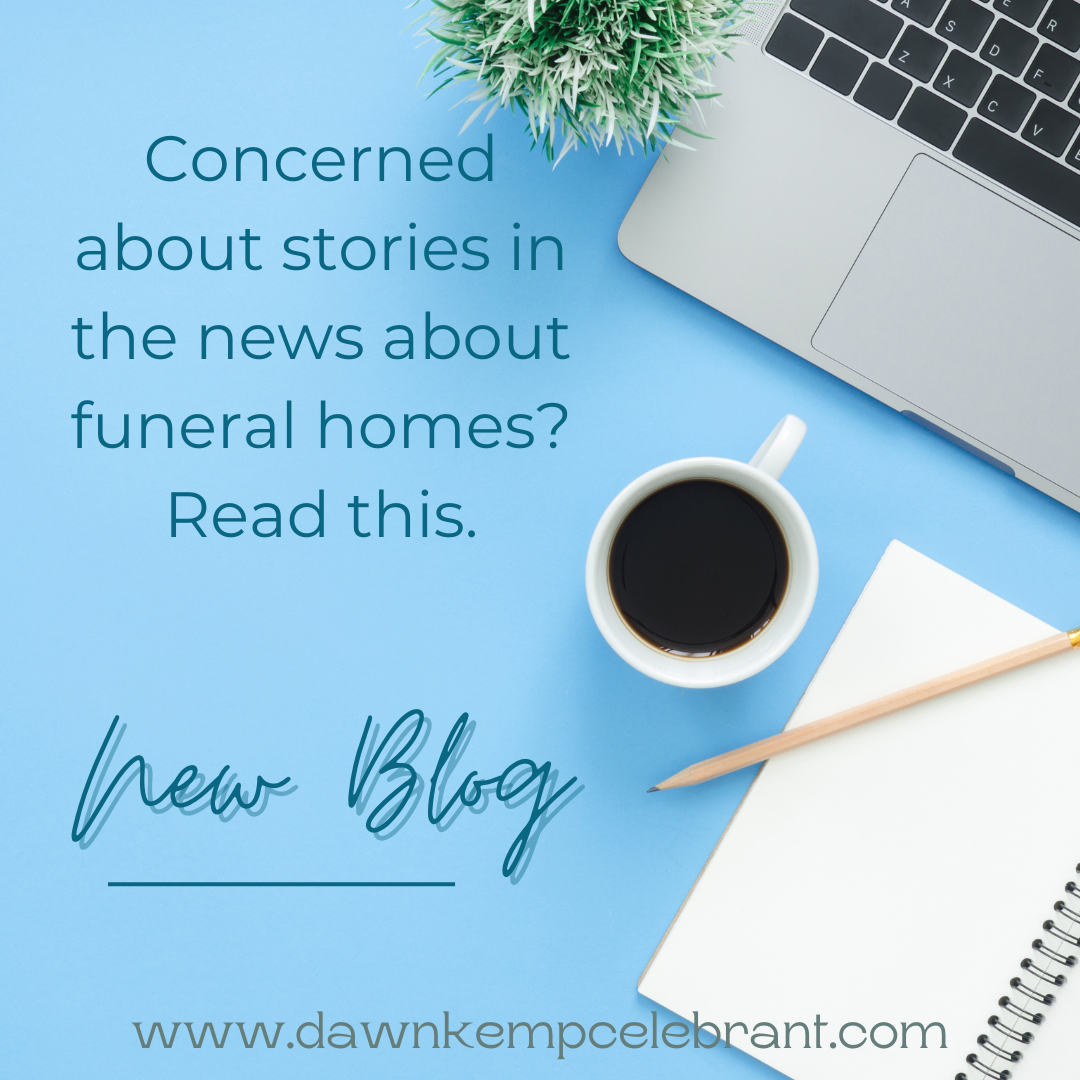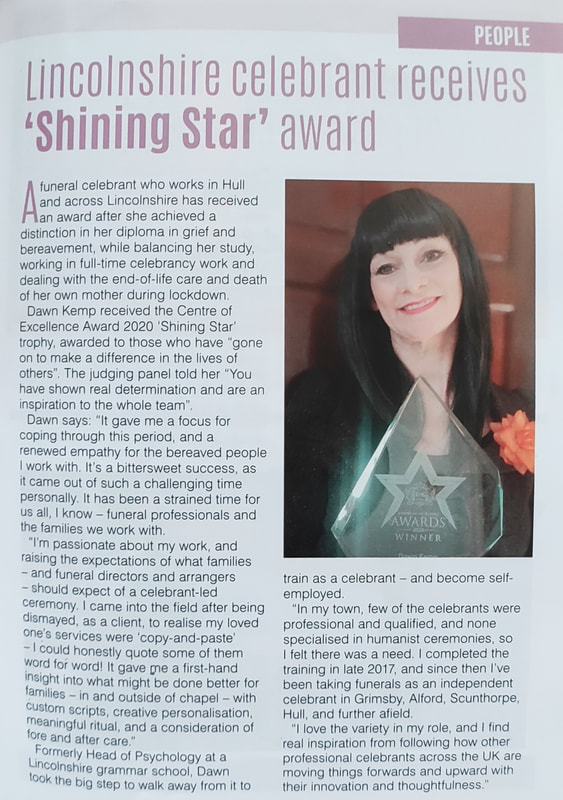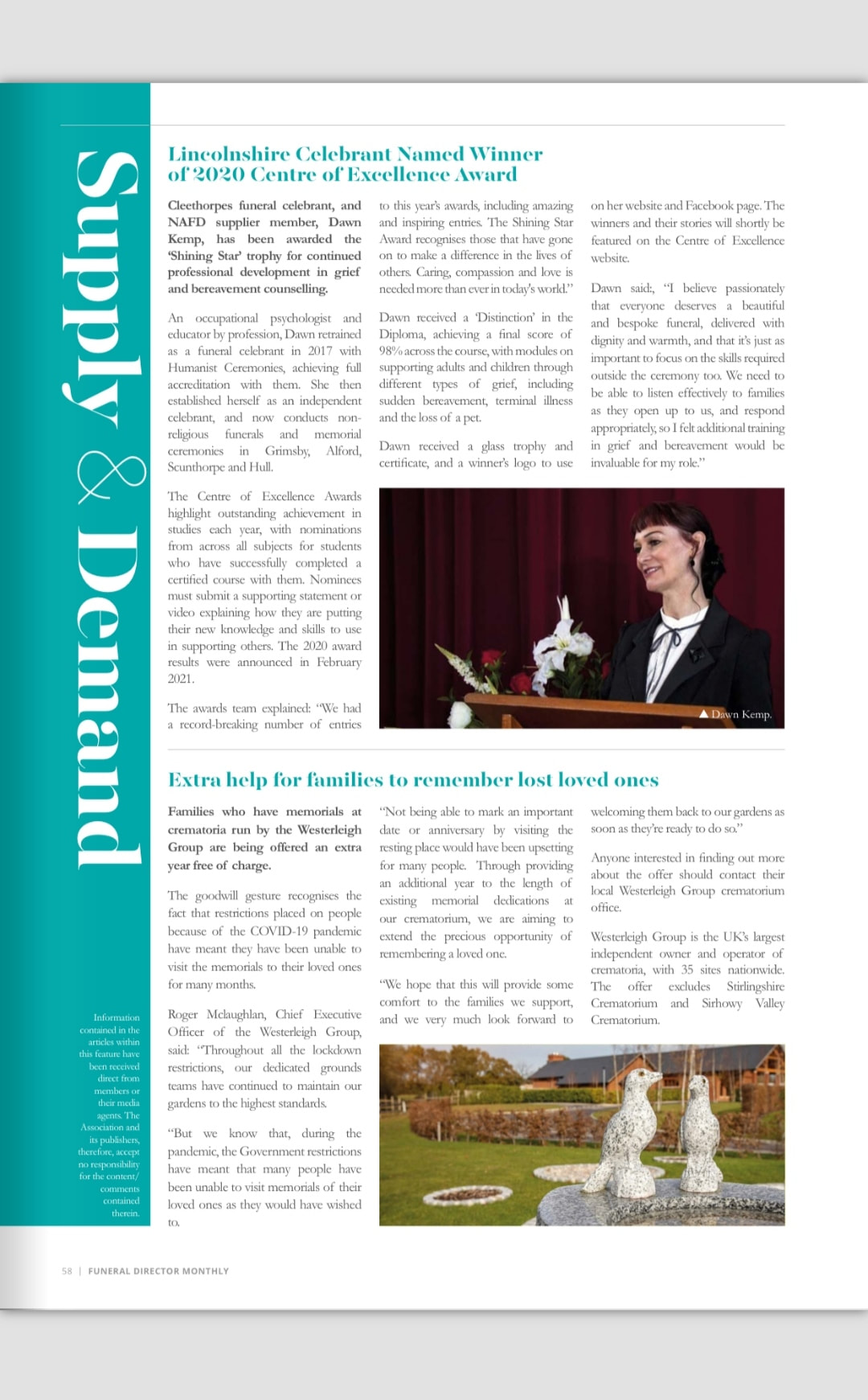|
The most-asked questions about funerals…
…are to do with when they are held. This is either searching when an upcoming service IS taking place (See Facebook post of 7 Aug 2023 for tips), or when it MAY or CAN be held. Can you have a funeral on a Saturday? Can you have a funeral on a Sunday? A twilight funeral? What about alternative locations for funerals? These are some of the popular questions. So, here are 20 factoids you need to know: They refer to funerals in England - there are different arrangements elsewhere. 1. Most funerals take place on weekdays typically between 9 – 4 2. Friday is the most favoured day - as it's more practical for arranging leave before the weekend. 3. Popular times are late morning & around lunch. These will book up fastest. You may have a wait if there's a particular day and time you have in mind. 4. Weekend funerals may be offered by churches, some crematoria & funeral directors at request. This may incur extra charges. 5. Some crematoria have ‘dynamic pricing’ – popular ‘slots’ cost more. 6. Shorter crem services, those for committal only, or unattended services (direct cremation), are cheaper. Ask your local bereavement services if the fees vary between days, times, and service chapels. 7. You may separate final disposition (what happens to the body) from ceremony (the celebration of life) and have them on different days. This can save money, distress and the rush to make arrangements. 8. Crematoria vary in the services available daily, due to the standard service length at each – from 20 minutes to 1 hour. Some worry that shorter services give a production-line feel, especially if mourners leaving and arriving cross. There are more options to avoid this. 9. Funeral days/times are a compromise between your preference, and logistics (e.g., how busy your funeral director is & their prep & travel between services – many independents have just 1 hearse). 10. Burial times may depend on season – with a shorter window as it gets dark earlier. Natural/green burial sites will advise you on the practicalities of a burial at their site. 11. Funeral celebrants offer the greatest flexibility over day, time (including twilight services) & location of farewelling, so contact them first. 12. Most UK funerals take place 2-3 weeks after a death. 13. Many religious funerals within 24 hours if practicable (Muslim, Hindu, and Jewish – but not on Shabbat), or a few days (Catholic). 14. There are more options for burial than you might think. You can be buried on your own land (subject to some regulations) .Even if you are not religious, you may be buried in your parish church, if there’s room. 15. Funerals may be delayed if a coroner’s report is required (not needed if a person dies within 4 weeks of being seen by a doctor for a condition) 16. For special requests, there may be a lead-time to factor in (e.g., availability of a themed hearse, custom-order coffin or shroud) 17. You may choose ANY crematorium. It doesn’t have to be the local one. 18. You may choose ANY location for the service, full stop! 19. Some funeral homes have their own service chapel. This may give you more privacy and an intimate feel. 20. Funeral celebrants specialise in alternative locations, such as a service at home, the village hall, or a venue barn or outdoor space (they’re not just for weddings!).
0 Comments
Every so often, a horror story reaches us regarding malpractice in a funeral home. Fortunately, these instances are rare, and most funeral directors and staff in the sector are caring and conscientious, and set themselves the highest standards.
A recent case in the news about a Hull funeral home has understandably broken the hearts of the dozens of families affected, and shaken the trust of the public in 'undertakers' and 'funeral parlours', as the media sometimes still refers to them. There is a fear of what might go on behind closed doors in the care of the deceased, and a worry about corner cutting motivated by profit. I understand the unease, through personal experience. I was once approached direct by a family to lead the service for their person. It was only when I met with them I discovered that the 'funeral director' was a known for offering a service that refelcted the very low fees. The family expressed concerns that they had not been treated well and prevented from seeing their loved one, and in my opinion, the funeral team at the service were shambolic, acting with less dignity than one would have hoped for. It was a sad sight. I stepped in to act as funeral director as the company didn't bother to send one! This was *not* the company currently making headlines, but similar operators do exist who fall far short of expected standards. How can this be? Most people are shocked to discover how little regulation there is in the funeral sector, and that it's relatively easy to set up as a funeral director (if you can afford to). So, here are a few things you should know, before you entrust your person, or yourself, to the care of a funeral home. Regulation in the Funeral Sector in England – An Overview This short guide looks at funeral homes only, and not funeral plan providers, crematoria, or online direct cremation companies. All information is given in good faith, and is indicative, not exhaustive. Some examples from Lincolnshire are used for illustration and clarification. A. What You Need to Know
B. Voluntary Trade Organisations & Codes of Practise There are two UK associations that set out a code of conduct for professional and ethical standards for funeral directors. These include guidance on best practice for care of the deceased, confidentiality and data protection, and handling of complaints.
The two bodies are: NAFD – National Association of Funeral Directors. Both independent funeral homes and corporate chains may be members. Look for the symbol of a gold lion on a blue background on funeral home literature. You can find the code here: https://www.nafd.org.uk/standards/the-funeral-director-code/ SAIF – National Society of Allied and Independent Funeral Directors. SAIF is, as the name suggests, for independently-run funeral homes. The logo is a pale blue oval on darker blue. You can find the code here: https://saif.org.uk/wp-content/uploads/2020/10/Code-of-Practice-Oct-2020-with-Logo.pdf When visiting a website or funeral home, look for a trade logo; and if there is none, ask why they have chosen not to join a trade body, if they have a code of practise, and what their feedback and complaints process is. Read reviews on the website, and better still, look at Google or Social Media platforms, where the funeral home cannot select which reviews appear. If reviews are turned off, this should be a red flag. Remember to leave a review after to help others comparing funeral homes, and credit good standards. If there are any concerns, report them to the trade body – assuming they’re in one - or in extreme circumstances, the police. C. Training Funeral directors do not have to have any training to set up a funeral home, or work as a funeral director. Some funeral homes will insist their funeral directors are trained to recognised standards, with accredited qualifications from the NAFD, and/or BIFD (the British Institute of Funeral Directors). Don’t assume that a logo on display means some/all funeral directors at the home are trained. For recognised qualifications:
Some funeral homes, whether group or family-owned, will have their own training systems. Others will have no trained staff at all. Enquire generally about how long the staff have worked there and what training they did, and if you’re not reassured, go elsewhere. D. Chains and Independents There are national chains (like Cooperative Funeralcare and Dignity), and regional chains (e.g. Lincolnshire Co-op and Beverley Funerals). Companies like these are usually members of the NAFD. Note that some still retain a prior name if a business that was once independent/family owned, has since been taken over (e.g. the once family-owned Kettle funeral home branches in Lincolnshire are now run by chains – by Cooperative Funeralcare in Grimsby, and Dignity in Brigg). Corporate branding colours and the footer of the website and documentation should indicate if the funeral home is part of a group. Independent or family-owned businesses may be members of the NAFD and/or SAIF, or neither. There are differences in the ways corporates and independents operate, in terms of their business model (e.g. if commission is offered, or there are sales targets to meet) and the type of care and personal service offered (e.g. if you are assigned a funeral director who will be your continuous point of contact). Standards are more likely to be comparable between branches with chains due to the management structure, but this does not indicate they are higher than those of independents. It is up to you to decide which is right for you. Chains benefit from economies of scale which may be reflected in an extensive product range, and fleet and staffing availability. Independents may be more affordable, lacking so many overheads, and offer a more personal service, with strong ties to, and understanding of, the local community. Bear in mind what was once your family’s go-to local funeral home may be staffed and operated differently if it is a long time since your family last used it. E. CMA Legal Orders As a result of the Competitions and Markets Authority survey of the funeral sector, and report on areas of concern to government in 2020, the following orders are now part of the legal requirement for funeral homes: 1. Funeral directors must display a Standardised Price List (including attended and non-attended funerals), Additional Options (such as collection of ashes and embalming) and up-to-date typical fees for local crematoria and burials. Look for these online and displayed in the window of the premises. This is so you can see total costs, and compare providers. You may compare and shop around to choose the funeral home and service that is right for you. Some categories may say POA or offer a price range. If you need help, ask for a printed itemised quote. Better still, call or pay a visit to a few funeral homes, and see if you feel comfortable with how they receive you and answer your questions. You may need to make an appointment, rather than drop in. 2. Funeral directors must display their terms of business (including payment options and late charges). This should be made clear to you before you enter into any contract. Some funeral homes require payment upfront; others will take a deposit. This helps you budget, and be aware of how much and when the payment of deposit and balance are due. Be sure to ask for this in writing, or by email, if it is not readily offered. 3. Funeral directors should not solicit for business (e.g. coroner contracts), offer incentives for referrals (e.g. from care homes), and must disclose interests (e.g. donations) and any conflict thereof. This is to deter profiteering through bribery and breach of trust. You may select your chosen funeral director yourself (and any related providers, such as celebrants and florists), and your choice should be informed, and free from bias or influence. For brevity, this piece has just scratched the surface, so if you have further questions, get in touch and I can answer your general queries or direct you to a trusted Grimsby funeral home or funeral director if you'd like to speak to one. If you'd like a pdf copy of this, email me at [email protected] © 2024 Dawn Kemp Celebrant www.dawnkempcelebrant.com Perhaps you’ve heard a friend or neighbour has died, or wish to check the date and time of a funeral.
Here are some ways to find out.
Still can’t find the service details? One of these may be why.
LINKS Funeral Notices https://funeral-notices.co.uk/national/death-notices Lincolnshire Cooperative Funerals https://www.lincolnshire.coop/funeral/obituaries Jason Threadgold https://www.jasonthreadgoldfuneraldirector.com/upcoming-services/ Near & Near https://www.facebook.com/Near-Near-Undertakers-Ltd/ People sometimes have questions about cremation, either because they have heard things that worry them, or are curious, as it's not something that is spoken about much.
Below is a link to a short film of the cremation process. If you are recently bereaved, or your grief is still raw, consider if this is the right time to watch it. Before you watch, it’s worth knowing that this is a no-frills old US crematory, without commentary, so you still may have questions. I'm always happy to answer questions. I’m ‘Death Positive’ – I believe people are empowered by knowing, and that death, dying and bereavement should be talked about, so people are equipped with information and choices. As the area’s Coffin Club ‘Celebrant Plus’, I’m here to advise and signpost anyone in the local community about funerary issues; you don’t have to be arranging a funeral or have me leading a ceremony to chat to me. Likewise, your funeral director and the staff at the crematorium are there to help. Don't be afraid to ask them. There's nothing weird or morbid about wanting to know what happens, and it may allay any fears. I was probably a bit scared of the idea of cremation and held some myths myself, until I witnessed it in full. I was honoured, when I first started, to be given permission to watch the full procedure for one lady (including taking regular peeps into the cremator to see what happened to her body, as you’ll see in the video). Pre-Viewing Notes: The set up back of house varies considerably, from modern shiny spacious crematory rooms with large steel chargers, and a sequence of stations for processing the remains, to a more functional affair in a smaller space. There is legislation that regulates administrative and practical procedures to ensure public health & safety and dignity in dealing with the deceased, cremation, and ashes return. A little slip follows the deceased and is checked at each stage from the moment the coffin or person (or pet) arrives by hearse or private ambulance. When the curtains close (if it's a funeral service, and you've requested that), nothing happens immediately. Forget what you've seen in films about seeing a coffin slide right through the doors into flames! Often there's a cool room, anteroom or corridor to the crematory area. Staff move the coffin onto a trolley. That may be cremated straight away, or there may be a short wait till later that same day. It depends on several factors including the number of cremator units, how busy that day is, coffin or shroud material, and some characteristics of the deceased that may affect unit efficiency, so the order of cremation may be optimised. Different body compositions, different diseases etc affect the time it takes, and the temperature of the unit. Rear of house, there are trained staff who operate the crematory. For some faiths, a family member may be there to witness the charging procedure. Only one person is cremated at a time in each cremator. Cremation of an adult human takes about 85-90 minutes. The remains are raked into a receptacle underneath before further processing. Metal components that can be recycled are then removed in a machine that separates the remains. These usually go to raise funds for charity. The remains then go into a cremulator which reduces them to ashes (or cremains). For children, or body parts, there may be minimal or no ashes. Likewise for a small pet funeral. Otherwise, the ashes then go into a container for collection by the funeral director or other person authorised to collect or scatter them. Some people request that the crematorium scatter the ashes. The staff will record where and give you a map. For people who wish to have them returned, they can then choose whether to transfer the ashes to a decorative urn, have an ashes interment ceremony, or scatter them at a place significant to the deceased, such as a beauty spot, or at sea. Some retain a little to be made into jewellery or paperweights. That’s just a very brief summary. If there’s anything else you’d like to know, or other topics you’d like covering (video tours of crematoria, or interviews with staff?), let me know. Dx The 5-minute cremation video. https://www.cultofweird.com/death/cremation-of-human-body-video/ The contact for bereavement services at Grimsby Crematorium. You'll also find the link for pet funerals at Treasured Memories. If it’s urgent, call. If it’s a general enquiry, send an email. Bereavement services | NELC (nelincs.gov.uk) Link to cremation FAQs: https://www.cremation.org.uk/Frequently-Asked-Questions Crematorium Regulations: cremregs (iccm-uk.com) Coffin Club and Celebrant Plus Directory coffinclub.co.uk/ Local Ashes Jewellery coastalsilver.co.uk/pages/ashes-jewellery #funeral #cremation #ashes #funeralcelebrant #Lincolnshire #Lincolnshirecelebrant #DeathPositive #funeralmyths Hurrah, I got to see the piece that was in Funeral Service Journal, thanks to a kind funeral director sending it to me.
In hindsight, I'd probably change some of what I said, but oh well! *snaffles celebratory Ferrero Rocher* Dx How lovely!
I'm featured in April's Funeral Director Monthly magazine, published by the NAFD (one of the main trade bodies for funeral directors). Here's the screenshot if you'd like to read it. Dx |
From DawnWelcome to the blog. Contact me if there's anything you'd like me to cover about celebrants, ceremonies (including weddings, namings, funerals) or related topics such a s vow writing, funeral planning etc. Archives
July 2024
Categories
All
|






 RSS Feed
RSS Feed
